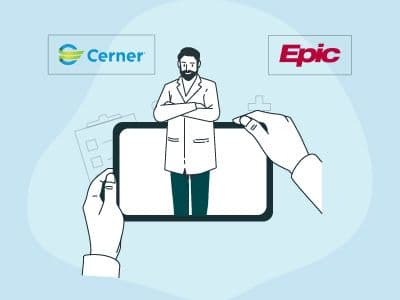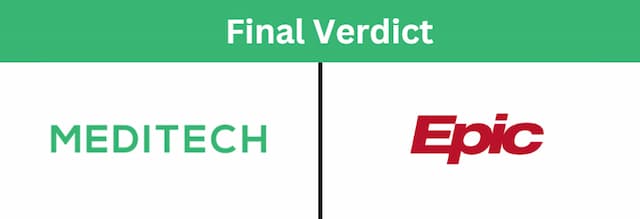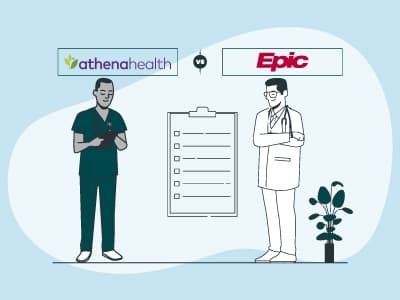Tired of Epic? Here's 10 Game-Changing Competitors
Compare Features
Feature List | Epic EMR | NextGen Office EHR | athenaOne | AdvancedMD | Practice Fusion |
|---|---|---|---|---|---|
Appointment Management/Scheduling | |||||
e-Prescriptions | |||||
Lab Integration | |||||
Patient Portal | |||||
Mobile App | |||||
Telemedicine | |||||
Billing and Invoicing | |||||
Claims Management | |||||
Customizable Forms | |||||
Patient Demographics |
Make decisions with real reviews from real users
Top 10 Epic Alternatives
Epic is one of the leading electronic health record (EHR) solutions in the health IT market, holding 39.1% of the U.S. acute care hospital market share. However, despite its widespread use, some users face challenges such as interoperability issues, high implementation costs, hidden long-term expenses, a complex user interface, and limited options for smaller hospitals. These issues may drive healthcare organizations to consider alternatives that better suit their needs.
Here, we will review the top 10 Epic alternatives to help you make an informed decision for your organization. For each product, we will cover:
- How the software compares to Epic
- Pros and cons
- Cost details
TL;DR: What’s the best alternative to Epic? Cerner stands out as the best Epic alternative, with its strong interoperability and flexibility for all types of healthcare organizations.
Our Top 10 Epic Alternative Recommendations
1. Cerner
- Best For: Large Hospitals (500+ beds)
- Overall Rating: 3.9 (143 Reviews)
- Free Trial: Not available
Cerner, now known as Oracle Health, is a leading provider of digital information systems used within larger healthcare settings. Compared to Epic, reviewers suggest that Cerner is more user-friendly, with an intuitive dashboard and a responsive design that works well on both desktop and mobile devices. This makes navigation easier than Epic’s interface, which has multiple modules for everything.
Cerner is also considered more cost-effective than Epic, with lower upfront and long-term expenses. This makes it a better choice for organizations looking to avoid Epic's high implementation costs and hidden fees. Moreover, the vendor has recently seen significant success in winning contracts with small standalone hospitals (≤200 beds), further proving its adaptability for various healthcare settings.
Overall, we recommend Cerner for its intuitive interface, advanced suite of features, and flexibility, which makes it a great choice for healthcare organizations of all sizes.
What Are The Pros And Cons Of Cerner?
Pros | Cons |
|
|
How Much Does Cerner Cost?
The cost of Cerner can vary based on the type, size, and requirements of healthcare organizations. It typically involves a one-time implementation fee, followed by ongoing subscription costs that can fluctuate depending on customization and additional features required.
2. MEDITECH
- Best For: Smaller Hospitals (1-150 beds)
- Overall Rating: 3 (69 Reviews)
- Free Trial: Not available
MEDITECH is a fully integrated EHR platform designed to help providers deliver patient-centered care. Unlike Epic, it offers a more structured and straightforward implementation process, which minimizes workflow disruption and reduces the complexity associated with EHR setup.
The platform is also recognized for its affordability, with lower upfront costs compared to Epic. This makes it a popular choice for smaller healthcare organizations looking for a reliable and cost-effective solution. Its steady growth among smaller providers highlights its effectiveness for these facilities.
We recommend MEDITECH for its interoperable interface, ease of implementation, and tailored features for smaller hospital settings.
What Are The Pros And Cons Of MEDITECH?
Pros | Cons |
|
|
How Much Does MEDITECH Cost?
MEDITECH does not disclose its pricing details publicly. The final cost may vary based on factors such as the size of the organization, required features, and customization needs.
3. athenaOne
- Best For: Independent Physician Practices
- Overall Rating: 4.1 (322 Reviews)
- Free Trial: Not available
athenaOne is an award-winning EHR platform designed to optimize clinical and operational efficiency for healthcare practices. Compared to Epic, athenaOne offers a more user-friendly interface that helps providers easily manage daily tasks and reduce the potential for burnout.
The platform also stands out with its transparent pricing model, where costs are based on your organization’s collections, with no hidden fees and minimal upfront costs. In contrast, Epic often involves more complex pricing structures and higher upfront expenses.
Overall, we recommend athenaOne for small to mid-sized healthcare facilities seeking multi-specialty support, transparent pricing, and an all-in-one software solution.
What Are The Pros And Cons Of athenaOne?
Pros | Cons |
|
|
How Much Does athenaOne Cost?
The cost for athenaOne is generally tied to the organization’s collections, which means pricing scales based on the volume of revenue generated by the practice.
4. eClinicalWorks
- Best For: Ambulatory Care Settings, Multi-Specialty Clinics
- Overall Rating: 3.4 (279 Reviews)
- Free Trial: Not available
eClinicalWorks is a feature-rich EHR system that offers tailored solutions for multiple healthcare specialties. When comparing the two, eClinicalWorks stands out for its strong usability, offering a cleaner, more intuitive interface that is easier to use and manage.
Many reviewers praise Eva, the system's virtual assistant, for enhancing workflow productivity by reducing unnecessary clicks. Additionally, the vendor offers transparent pricing plans, starting at $449 per provider per month. Unlike Epic, eClinicalWorks has no startup costs and includes free data migration from your existing EHR.
Overall, we recommend eClinicalWorks for its ease of use and smart tools designed to enhance both clinical and operational efficiency across healthcare practices of all sizes.
What Are The Pros And Cons Of eClinicalWorks?
Pros | Cons |
|
|
How Much Does eClinicalWorks Cost?
eClinicalWorks offers three different pricing plans depending on the functionalities needed by healthcare practices. The available options include:
- EHR Only – $449/month/provider
- EHR with Practice Management – $599/month/provider
- RCM as a Service – 2.9% of practice collections
5. Allscripts
- Best For: Family Practice, Internal Medicine, and Pediatrics
- Overall Rating: 3.6 (111 Reviews)
- Free Trial: Not available
Allscripts, now known as Veradigm, offers a full suite of healthcare provider solutions designed to streamline clinical and financial workflows. When compared to Epic, Allscripts stands out with its fully cloud-based interface that allows healthcare providers to adapt quickly without extensive training. This provides seamless access to patient data across different devices and locations.
A standout feature of Allscripts is its AI-driven Predictive Scheduler, which forecasts patient demand to optimize scheduling, reduce wait times, and improve resource allocation. This gives Allscripts an advantage over Epic, which offers similar features but may cost more and require solid customization.
We recommend Allscripts for its cloud-based interface, scheduling capabilities, and flexibility in adapting to user needs.
What Are The Pros And Cons Of Allscripts?
Pros | Cons |
|
|
How Much Does Allscripts Cost?
Allscripts offers customizable and flexible pricing plans that vary based on your organization’s size, type, and feature requirements.
6. NextGen
- Best For: Behavioral Health, Cardiology
- Overall Rating: 3.9 (651 Reviews)
- Free Trial: Not available
NextGen is an all-in-one EHR solution designed to help practices meet their clinical, operational, and financial goals. Like most of Epic’s competitors, it offers a subscription-based pricing model that ensures predictable costs and scalability for smaller healthcare facilities. This flexible pricing structure allows providers to select only the features they need, helping them avoid unnecessary costs.
Moreover, the system stands out for its ease of customization. Many users appreciate how it allows practices to tailor workflows more easily, whereas Epic’s customization process is often described as more rigid, often requiring additional assistance from the support team.
We recommend NextGen for its specialty-specific solutions and configurable interface, which makes it an excellent choice for small to mid-sized healthcare settings.
What Are The Pros And Cons Of NextGen?
Pros | Cons |
|
|
How Much Does NextGen Cost?
NextGen does not publicly disclose its pricing details. The cost of the software can vary depending on your practice’s size, specialty, and number of users.
7. Tebra
- Best For: Primary Care, Mental Health, Pediatrics
- Overall Rating: 3.5 (206 Reviews)
- Free Trial: Not available
Tebra (formerly Kareo + PatientPop) is a comprehensive EHR platform designed to streamline practice workflows and optimize the revenue cycle process. The system offers a quicker setup with fewer resource demands compared to Epic, which often requires extensive customization and ongoing support due to its complex system. It provides a free online training portal and knowledge base, enabling practices to get up to speed efficiently.
The software also uses advanced robotic process automation to streamline billing and reduce manual errors, whereas Epic’s billing process can be more time-consuming and resource-intensive. This makes Tebra ideal for small to mid-sized practices that want an easy-to-use system with fast implementation.
Overall, we recommend this solution for its simple interface, automation features, and comprehensive support resources.
What Are The Pros And Cons Of Tebra?
Pros | Cons |
|
|
How Much Does Tebra Cost?
Tebra offers customizable and flexible pricing options for its users. This allows clinics to choose a plan that fits their operational and financial needs.
8. DrChrono
- Best For: Multi-Specialty Practices
- Overall Rating: 3.6 (208 Reviews)
- Free Trial: 30-day free trial available
DrChrono’s EHR solution helps practices across over 20 specialties manage their clinical, financial, and administrative workflows through a centralized system. It stands out with its user-friendly interface, responsive customer support team, robust RCM services with a 96% clean claim rate, and seamless integration with Apple devices like iPads and iPhones.
While Epic is better suited for larger healthcare organizations requiring advanced features, DrChrono is an excellent choice for smaller to mid-sized practices that prioritize simplicity, accessibility, and quick software implementation.
We recommend DrChrono for its easy navigation, compatibility with Apple products and extensive suite of billing solutions for multiple healthcare specialties.
What Are The Pros And Cons Of DrChrono?
Pros | Cons |
|
|
How Much Does DrChrono Cost?
DrChrono offers the following four customizable subscription plans:
- Prometheus – EHR & Practice Management
- Hippocrates – Advanced EHR & Practice Management
- Apollo – EHR, Practice Management & Medical Billing Software
- Apollo Plus – EHR, Practice Management & Revenue Cycle Management Services
9. AdvancedMD
50% Internal Medicine, Mental Health, Multi-Specialty Facilities
- Overall Rating: 3.8 (307 Reviews)
- Free Trial: Telemedicine software trial available
AdvancedMD is an all-inclusive EHR and practice management solution for modern independent practices. Reviewers suggest that compared to Epic, AdvancedMD is more accessible for smaller practices, offering a 100% cloud-based platform that is easy to learn and use.
Its mobile-forward suite adapts to different practice workflows without requiring extensive customization. Additionally, the software’s subscription-based pricing model provides a cost-effective alternative for practices with budget constraints.
We recommend AdvancedMD for its user-friendly design, extensive range of mobile apps, and affordable solutions for independent practices.
What Are The Pros And Cons Of AdvancedMD?
Pros | Cons |
|
|
How Much Does AdvancedMD Cost?
The vendor offers three standard pricing options with custom pricing:
- Build a Bundle
- Software Pricing
- RCM Pricing
10. Practice Fusion
- Best For: 1-3 Clinician Practices
- Overall Rating: 3.6 (286 Reviews)
- Free Trial: 14-day free trial available
Practice Fusion offers intuitive EHR and billing solutions for independent healthcare practices. Compared to Epic, the primary standout feature of Practice Fusion is its ease of use and quick implementation process.
Its user-friendly interface and practical features make it particularly well-suited for small medical practices. The platform streamlines charting and other day-to-day tasks to support solo practitioners and small teams in managing their workflows effectively.
We recommend Practice Fusion for its specialty-specific templates, billing tools, and e-prescribing functionalities, making it a great choice for solo and individual practices.
What Are The Pros And Cons Of Practice Fusion?
Pros | Cons |
|
|
How Much Does Practice Fusion Cost?
The cost for Practice Fusion starts at $149 per month per provider, with an annual commitment required.
How We Chose Our Epic Alternatives?
We at Software Finder conducted a thorough evaluation of various EHR systems to identify the best alternatives to Epic. Our review process included the following key steps:
- User Feedback: We analyzed user reviews and gathered feedback from over 50 Epic users through surveys and direct interviews to understand their experiences and challenges
- Hands-On Testing: We tested software demos and free trials to carefully assess functionality, ease of use, and integration capabilities in real-world scenarios
- Industry Expert Collaboration: We collaborated with healthcare professionals to gain insights into specific needs and how different alternatives address them
- Feature Evaluation: We evaluated each software based on usability, pricing, flexibility, customer support, and customization options to ensure suitability for different healthcare practices
- Final Recommendations: After thorough analysis, we selected alternatives that effectively address the pain points and challenges faced by Epic users
Selecting The Best Epic Alternative
Selecting the right alternative to Epic can be challenging due to the variety of options available, each with different features, pricing models, and customization levels. It is important to carefully evaluate your specific needs, budget, and workflows to find a solution that best aligns with your practice requirements.
Additionally, you should consider scheduling software demos, comparing pricing structures, and gathering feedback from other healthcare professionals to assess a vendor's reliability. This comprehensive approach will help you make an informed decision when selecting the best Epic alternative for your unique needs.





